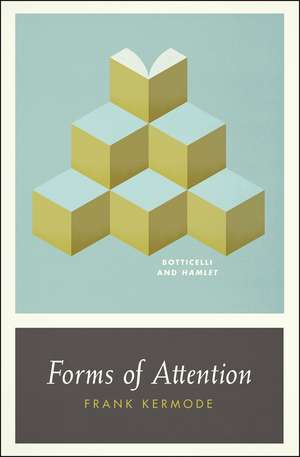Forms of Attention: Botticelli and Hamlet
Autor Frank Kermode Cuvânt înainte de Frank Lentricchiaen Limba Engleză Paperback – 6 oct 2011
Sir Frank Kermode, the British scholar, instructor, and author, was an inspired critic. Forms of Attention is based on a series of three lectures he gave on canon formation, or how we choose what art to value. The essay on Botticelli traces the artist’s sudden popularity in the nineteenth century for reasons that have more to do with poetry than painting. In the second essay, Kermode reads Hamlet from a very modern angle, offering a useful (and playful) perspective for a contemporary audience. The final essay is a defense of literary criticism as a process and conversation that, while often conflating knowledge with opinion, keeps us reading great art and working with—and for—literature.
Preț: 73.57 lei
Preț vechi: 122.02 lei
-40% Nou
Puncte Express: 110
Preț estimativ în valută:
14.08€ • 14.70$ • 11.65£
14.08€ • 14.70$ • 11.65£
Carte indisponibilă temporar
Doresc să fiu notificat când acest titlu va fi disponibil:
Se trimite...
Preluare comenzi: 021 569.72.76
Specificații
ISBN-13: 9780226431758
ISBN-10: 0226431754
Pagini: 112
Dimensiuni: 133 x 203 x 13 mm
Greutate: 0.14 kg
Editura: University of Chicago Press
Colecția University of Chicago Press
ISBN-10: 0226431754
Pagini: 112
Dimensiuni: 133 x 203 x 13 mm
Greutate: 0.14 kg
Editura: University of Chicago Press
Colecția University of Chicago Press
Notă biografică
Frank Kermode (1919–2010) was a British literary critic who taught English literature at University College London, the University of Cambridge, Columbia University, and Harvard University. His criticism was regularly featured in the London Review of Books and the New York Review of Books, and he was the author of many books including The Sense of an Ending; The Classic; The Genesis of Secrecy; and, most recently, Concerning E. M. Forster. Kermode was knighted in 1991.
Cuprins
Foreword
Preface
1 Botticelli Recovered
2 Cornelius and Voltemand: Doubles in Hamlet
3 Disentangling Knowledge from Opinion
Preface
1 Botticelli Recovered
2 Cornelius and Voltemand: Doubles in Hamlet
3 Disentangling Knowledge from Opinion
Recenzii
“[Kermode] was drawn to the entanglements of the text and its rational mysteries rather than some scaffold of theory. . . . He protected the reader’s freedom to be interested in whatever was interesting. That meant writing a prose that was never wholly academic and over the years became more and more open to the intersection of literature and the lives we’re actually living.”
“Kermode’s volume has the virtue of a lecturer’s accessible style designed for a listening audience. It is also self-consciously spare of ‘naked criticism.’ There is, nonetheless, an abundance of learned commentary, steady substance, and unveiled critical excellence. Which is to say the volume is a useful and engaging reflection of its learned author.”
